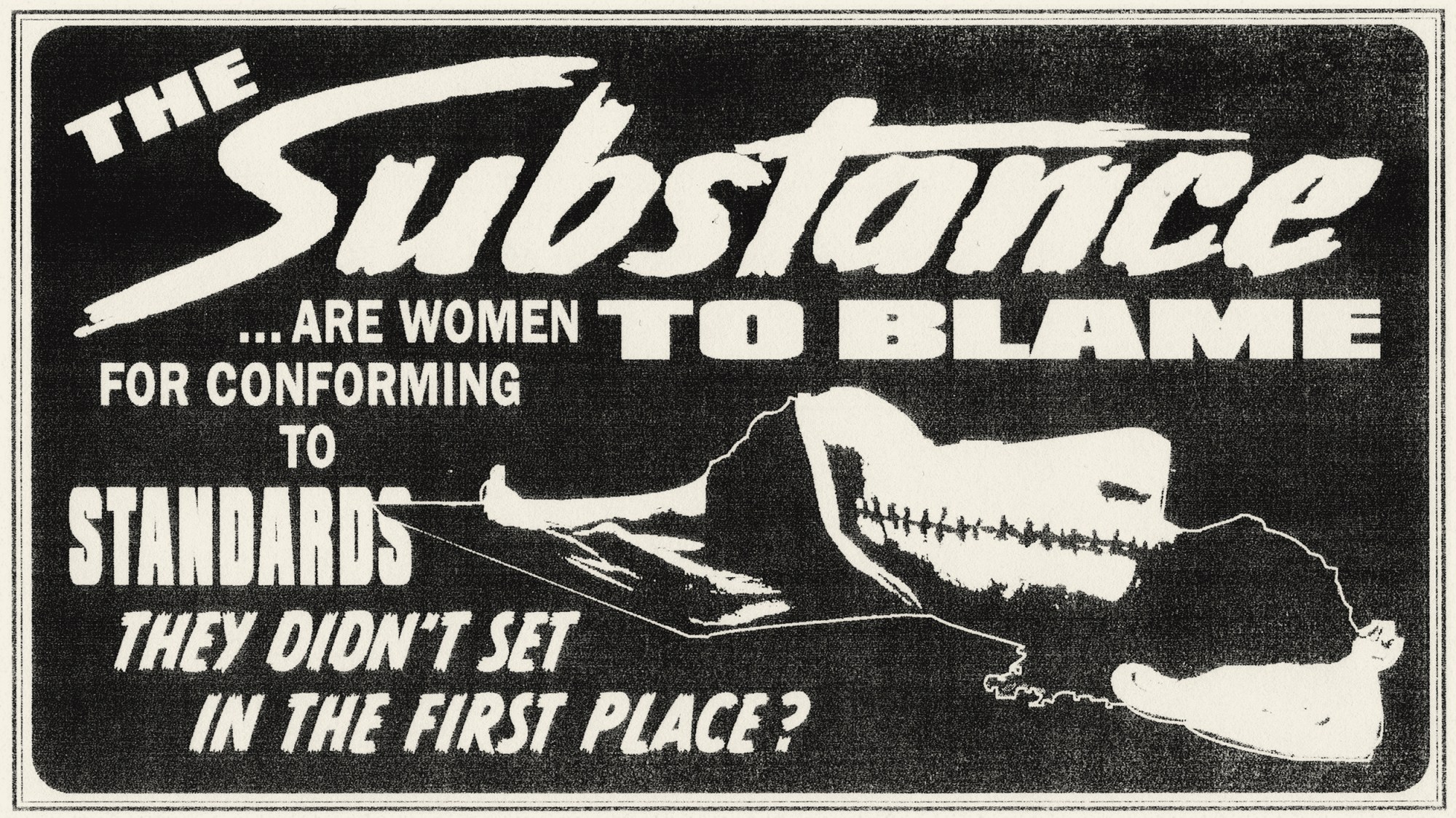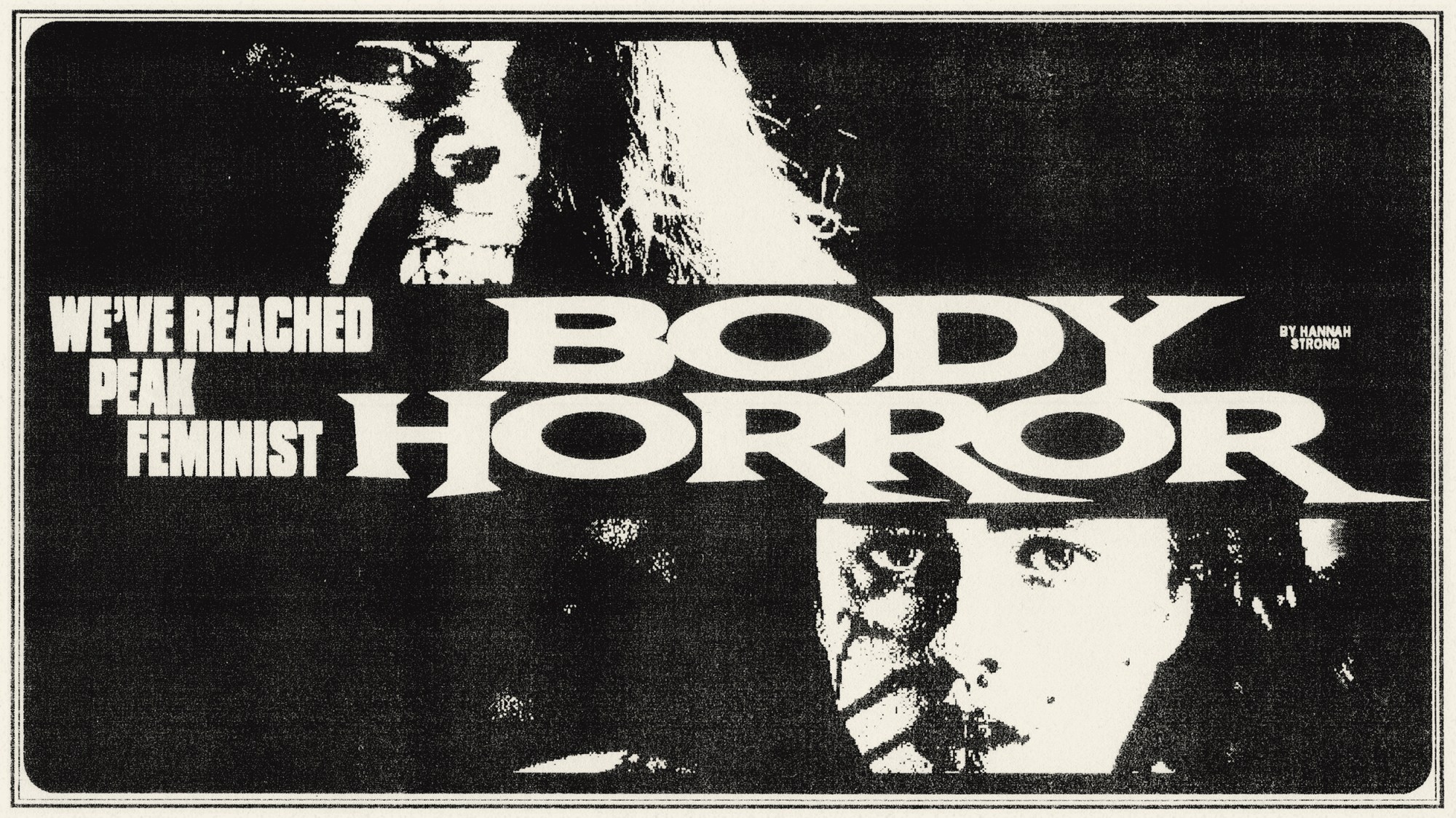There is a near-£800 billion economy built on supposed solutions to the so-called problem of women being ugly, fat or old. This is the age of 37-step skincare routines for 10-year-olds, Brazilian butt lifts and aestheticians who can scrape out your buccal fat in less time than it takes to get a good haircut.
It makes sense, then, that female filmmakers are turning to the subgenre of body horror to explore the tribulations of modern womanhood. In Coralie Fargeat’s The Substance, an ageing TV star takes a black-market drug to create a younger version of herself; Marielle Heller’s Nightbitch is about a woman who gives up her career to have a baby, and subsequently finds herself transforming into a dog. Both films do plenty of bone-crunching work to make their audiences shudder, but, for me, another nauseating truth oozes through the exoskeletons of these projects: that these visions of “feminist body horror” are in danger of becoming another corporate sales message. Only this time, we’re getting sold the problems themselves, rather than any kind of solution.
Characterised by scintillating gore, a propensity to make audiences uncomfortable and underlying ideas about the connection between our bodies and minds, body horror as a subgenre arguably originated with proto-scream queen Mary Shelley. Her 1818 novel Frankenstein concerns Victor Frankenstein, a doctor who goes against nature and God to create a man from disproportionately sized body parts. Victorian society ate Shelley’s novel up, but the idea that such a grotesque read came from a woman scandalised her male contemporaries so greatly that they accused her of “forgetting the gentleness of her sex.”
When it comes to cinema, though, David Cronenberg is the big daddy of body horror, with an unsettling, fleshy library of work – among them The Brood, Videodrome and Crimes of the Future – spanning 50 years. Cronenberg took what Mary Shelley started – pushing an audience’s squeamish buttons – and put it on film, creating films about psychosexual stimulation at the scenes of car crashes (Crash) or a perverse God complex that results in a Kafkaesque transformation (The Fly).
Cronenberg is far from the only filmmaker who’s shaped the body horror subgenre, but he has directly inspired a new generation of artists, be it Charli xcx, whose 2022 album Crash drew on his film of the same name, or Julia Ducournau, director of the gruelling films Raw and Titane, who has spoken previously about how “foundational” his work was to her.
The evolution of body horror into “feminist body horror” – dealing with the unique frustrations of being a woman, including sexism, self-loathing and the disconnect between mind and body – makes sense. It’s a fitting genre to explore and articulate the pain, fear and anger that comes with existing under the boot heel of patriarchy, offering catharsis and community where often, in reality, there is none.

Coralie Fargeat is often compared to Ducournau, and The Substance provoked the kind of strong reaction at the 2024 Cannes Film Festival that Raw and Titane did back in 2016 and 2021 respectively. The Substance takes place in a facsimile of Hollywood, smooth and shaved, where a dance instructor named Elisabeth Sparkle (played by Demi Moore in a part touted as the instigator of an impending ‘Demissaince’) is fired from her TV gig on her 50th birthday for having the audacity to age. “People always ask for something new,” Dennis Quaid’s perma-tan network exec – called Harvey, because subtlety is overrated – tells her, chewing loudly on a mouthful of shrimp. “At 50…well. It stops.” Soon, she’ll be secretly slipped some information on a new medical treatment called ‘The Substance’. Taking it will make her “younger. More beautiful. More perfect” by releasing “another version of [her]self.” Allured by the prospect of clawing back her youth, Elisabeth picks up her package from a nondescript parcel locker and follows the instructions, injecting herself with an ominous yellow fluid. And so, Margaret Qualley’s impossibly beautiful, blissfully wrinkle-free character Sue slithers forth from her spine, like Eve from Adam’s rib, and immediately gets the job as Elisabeth’s replacement.
In theory, The Substance sets up something pretty fun: All About Eve by way of Dr. Jekyll and Mr. Hyde, where the hot new thing replacing the old news is a flesh-and-bone younger version of the protagonist. But the wheels fall off pretty quickly when it becomes apparent there is little connection between Sue and Elisabeth – no shared memories or emotions – other than a slight physical resemblance. A later reveal unveils one thing that binds them: when Elisabeth binge eats fast food in a depressive state, it causes Sue to physically suffer too (she berates Elisabeth as “gross, old, fat, disgusting” for it.) It’s as if the act of eating is a moral failing – a dangerous suggestion given that 8.6% of women will experience an eating disorder in their lifetime.
“These films give some stabs at radicalism that never stick”
The Substance wants to hold a mirror up to Hollywood, showing the ways women torture themselves to remain relevant in the eyes of adoring fans, but when the only person who suffers is the main body in the frame, it feels less like a critique of the patriarchal entertainment industry and more a lambasting of women for conforming to the standards they didn’t set in the first place.
Marielle Heller’s Nightbitch – based on Rachel Yoder’s 2021 novel of the same name – suffers from a similarly misjudged execution, as Amy Adams bravely forgoes make-up and hair to play ‘Mother,’ an exhausted artist turned reluctant stay-at-home-mom who realises she’s turning into a dog, with bonus nipples and a protruding tail. Her husband, a whining, hapless man-child played by Scoot McNairy, is not aloof as much as he is oblivious, as if he’s never met a woman.
Despite her isolation and obvious symptoms of postpartum depression – which the film never mentions, let alone considers – Mother still views herself as morally superior to the other moms (and it’s only moms) she meets at various baby events. She has a deep-rooted fear of becoming a mother who unironically goes to ‘Book Babies’ at the local library because she thinks ‘Book Babies’ is cringe. We learn all of this in exhausting, constant voice-over from Mother, replicating the first-person perspective of the novel but in the process removing any space for ambiguity. Nightbitch has the sort of thorny, absurd concept that might work if approached with a scant fatalism, in the style of say, Athina Rachel Tsangari’s antisocial coming-of-ager Attenberg or Onur Tukel’s brutal, semi-absurd Catfight. But with the perpetually chirpy voice of Mother at every turn and its peppy soundtrack (complete with Yeah Yeah Yeahs and Joanna Newsom needle drops,) the visceral female unpleasantness that Marielle is reaching for – that she so beautifully articulated in Can You Ever Forgive Me? and The Diary of a Teenage Girl – never quite comes to pass. Where it promises maternal rage and righteous catharsis there is none – just a middle-aged man getting squeamish about his wife having her period, and a load of dogs running around the neighbourhood at night.

The Substance and Nightbitch are aesthetically opposite – one stark and vicious and barely written, the other wordy and homey and dithering, but they converge on ideas about womanhood and bodily autonomy, and no amount of sleek aestheticism can hide a lack of…well, substance. Where The Substance denigrates women for the sin of vanity while letting men off the hook, Nightbitch observes the inherent unfairness of the patriarchy…while letting men off the hook. It’s as if there is a fear of alienating half the audience (both films were widely praised by male critics after their festival premieres for their apparent boldness and humour) even in films that purport to address womanhood and speak directly to female-identifying viewers. With their supposed shock-and-awe loglines and stunt set pieces (a giant, fleshy monster! A woman as a dog, killing a cat!) there is some stab at radicalism that never sticks and feels filtered through a lens of palatability.
When we talk about body horror, we talk about the capacity of cinema to expose our deepest fears, thoughts and desires through violations or modifications of the physical. There lies incredible potential within our literal flesh and bones – The Wachowskis’ covert body horror The Matrix is an iconic trans allegory, while Jordan Peele used the genre to expose the insidious nature of modern racism in Get Out. But when it comes to working through the modern hell of womanhood, these hollow gestures at very real misogyny aren’t sharp enough to cut.
Writer: Hannah Strong
Graphics: Colin Doerffler
